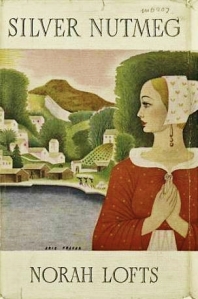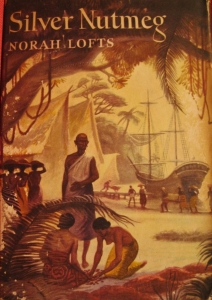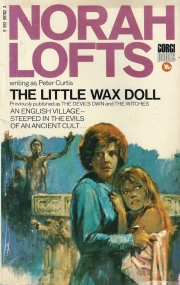 White Hell of Pity by Norah Lofts ~ 1937. This edition: Corgi, 1972. Paperback. ISBN: 552-08393-3. 188 pages.
White Hell of Pity by Norah Lofts ~ 1937. This edition: Corgi, 1972. Paperback. ISBN: 552-08393-3. 188 pages.
Get your head around that title. It’s a stunner, isn’t it?
This was Norah Lofts’ third published book, after a book of connected short stories, I Met a Gypsy (1935), and a historical fiction, Here Was a Man: A Romantic History of Sir Walter Raleigh (1936). White Hell of Pity went off on another tangent, that of contemporary realism, with a splash of the darkly gothic which was to show up so very often in Lofts’ subsequent 40+ books.
Let me say right now, this is a fantastic little novel, and it’s worth getting past that awful title.
Our young protagonist, Emmie Bacon, starts out in life with all the disadvantages possible, being raised in the rural country cottage equivalent of a dismal slum. Her mother tries to abort her, and that pretty well sets the scene for Emmie’s childhood years. She’s not a “wanted” child, nor are her numerous siblings.
Luckily (or perhaps unluckily?) Emmie is an intelligent child, a natural scholar, and she catches the eye and attention of one of her school teachers, which comes in handy when the thirteen-year-old flees the maternal home to escape a brutal attempted rape by her mother’s boyfriend. Straight to Miss Stanton flees Emmie, and Miss Stanton does her best for her protegé. She staunchly confronts and turns away Emmie’s horrid mother when she comes looking for her offspring. (Mrs. Bacon is keen to have Emmie back, as when she turns fourteen she may leave school and start bringing home a wage.)
Miss Stanton finds Emmie a place in a well-regarded boarding school run by an old school chum, and pays Emmie’s fees out of her own not very generous teacher’s salary, regarding Emmie’s future as something of a sacred trust, and Emmie, blossoming in her new environment, seems set to fulfill all of Miss Stanton’s hopes.
This goes on for a few years, and then things come crashing down, with the sudden arrival of what will turn out to be one of Norah Lofts’ stock characters, an Evil Lesbian. Jealous Ella Frome has been impatiently watching Miss Stanton’s activities from the sidelines, and now wishes to resume their old Special Friendship, which Miss Stanton has sternly discontinued once she takes on young Emmie. (Just so you know, Miss Stanton is a Good Lesbian, or possibly a Conflicted Lesbian, who doesn’t appear to have sexual designs on Emmie; she is beautifully disinterested in Emmie’s person, loves her for her mind alone, and concentrates solely on helping her find a better place in the world than that she came from.)
Here’s Ella:
Ella Frome, who had been a plain and dowdy student, noticeable only for her style of hairdressing, had become an elegant combination of masculine trimness and feminine touches. Her hair was still cut short, but her nails were brilliantly lacquered. She wore a severe tailored suit and over it, when she arrived in her car, a mannish camel-hair coat: but she had large pearl earrings in her ears, and a sweet subtle perfume rose from her hair and her clothes. Her voice was hybrid too. Generally it was deep and abrupt, but now and then it sank unexpectedly into a caressing dulcet murmur. She was obviously extremely fond of Helen Stanton. For Emmie she had only the flintiest of stares, the most strident voice.
Ella promptly takes Emmie aside and gives her the what for, informing her that Miss Stanton is undergoing financial distress in order to keep Emmie in school, and Emmie’s over-developed sense of guilt flames up. Off she trots to find herself a servant’s job, and the sad decline of her young life from its brief peak has begun.
I’m going to stop right there, with the recommendation that if at all possible you like-minded Norah Lofts appreciators find this elusive novel and dig right in. Spoiler alert (of sorts): it doesn’t end well. Like, really not well.
Lofts has created a heroine in Emmie who truly engaged my interest, and I became very invested in her trials and tribulations, hoping beyond hope that she would get another break, quietly cheering at her moments of joy and inwardly sobbing at her continual setbacks. I even flipped ahead to read the last page, and let me tell you I wasn’t very happy at what I read, but I forgive Norah Lofts, because she made it all make sense from Emmie’s point of view, even as I wished for the authorial hand to pluck her character away from her sad fate.

Here’s the 1st edition dust jacket. I sure wish I could acquire a hardcover copy of this one – my paperback 1972 Corgi has deconstructed, and only a rubber band holds it together now. But sadly these are in the scarce-as-hen’s teeth category, save for one lonely hc on offer through ABE for $200. It’s a good book for its sort, but not that good.
Norah Lofts is a hard author to classify. She’s not what one would consider a literary writer, though her historical fictions are very well-regarded for their detailed verisimilitude. Lofts was an accomplished researcher, and well able to transform dry facts into poignant semi-fiction; her years as a history teacher before she became a bestselling writer stood her in good stead.
Lofts also isn’t afraid to go into some rather dark places in her stories; happy endings occasionally appear, but they are rather the exception. She’s a very smart writer; she never talks down; her standard is very high indeed, higher than the norm perhaps was in the popular fiction of her time. If one could cross Rose Macaulay with (maybe?) Mary Stewart, with a dash of something even grittier thrown in, one might come close to categorizing her.
So. This book.
My rating: 9.75/10 (Quarter point off jointly for that dismal title, and for the Evil Lesbian, who’s just too, too stereotypical.)
Good stuff, if you like this sort of thing.
I apparently do, as does writer Katherine Edgar, whose blog post Norah Lofts, and why you should read her makes a convincing argument for exactly that.
Caveat! There are some duds in Lofts’ ouevre, too. If you don’t hit it off with one, you might well love another. There are about fifty to choose from, written between 1935 and 1984. If you are looking for an entry-level Lofts, I would suggest Jassy for contemporary fiction, and The Concubine for historical fiction. Wikipedia has a list of all of her books.



















